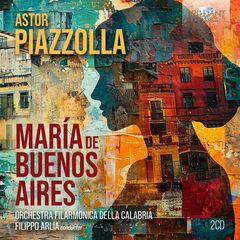Astor Piazzollas zweiteilige Tango-Operita Maria de Buenos Aires ist ein Hochlied auf den Tango in einer ganz besonderen Form von Musiktheater, die Gedichte und Musik vereint in einer Parabel, die die Geschichte des Tangos in der Person Marias erzählt. Maria ist also der personifizierte Tango: « Ich bin Maria… Maria Tango, María der Vorstadt, Maria Nacht, María fatale Leidenschaft, María der Liebe zu Buenos Aires bin ich!“. Sie erlebt die seltsamen Verwandlungen des Tanzes, die Einflüsse fremder Kulturen, Glück suchend berauscht sie sich, spielt, verkauft sich und wird sterbend zur mythischen Gestalt, die als Schatten durch Buenos Aires schwebt, nicht ohne ein Mädchen zur Welt gebracht zu haben, Maria. Der Tango lebt weiter.
Diese Geschichte, so erzählt, klingt verhältnismäßig banal, doch wer den Text des Dichters Horracio Ferrer liest, sieht rasch, mit welch tiefgründiger Poesie er es zu tun hat. Es ist ein Meisterwerk, das ein einzigartiges, unwiderstehliches Musikstück geboren hat.
Filippo Arlia, die beteiligten Solisten und das Orchester aus Kalabrien haben dieses Stück in eine authentisch klingende Interpretation gegossen, deren Wirkung man sich nicht entziehen kann. Eine nie abfallende Spannung, ein hohes musikalisches Niveau und eine wundervolle, ja magische Atmosphäre ergreifen den Zuhörer. Ein Minitrip nicht nur nach Buenos Aires, sondern geradezu in die Mysterienwelt des Tangos!
Astor Piazzolla’s two-part tango operetta, María de Buenos Aires, is a tribute to tango in the form of a musical parable that combines poetry and music to tell the story of tango through the character of Maria. Maria is the personification of tango. « I am Maria… Maria Tango, Maria of the suburbs, Maria Night, Maria Fatal Passion, Maria of Love for Buenos Aires – that I am! » She experiences the strange transformations of the dance and the influences of foreign cultures. Intoxicated by her search for happiness, she plays and sells herself. Dying, she becomes a mythical figure, floating through Buenos Aires as a shadow. However, she does not die without giving birth to a girl named Maria. The tango lives on.
Though this story sounds relatively banal, anyone who reads the text by the poet Horacio Ferrer quickly realizes they are dealing with profound poetry. It is a masterpiece that gave birth to a unique and irresistible piece of music.
Filippo Arlia, the soloists, and the Orchestra of Calabria have poured their hearts into an authentic interpretation of this piece, the effect of which is impossible to resist. Never-waning tension, a high musical standard, and a magical atmosphere captivate listeners. It’s a mini-trip not only to Buenos Aires but also right into the mysterious world of tango!




















